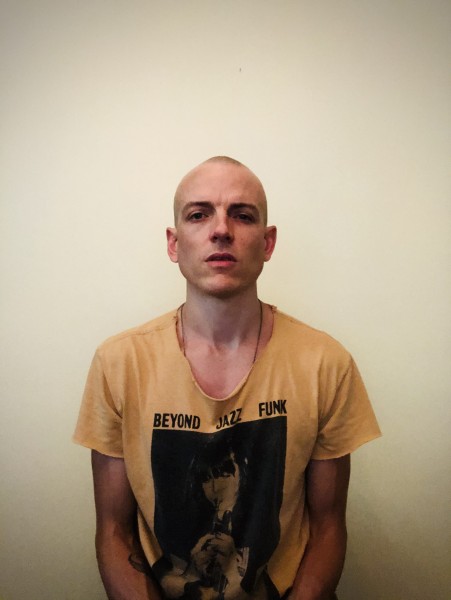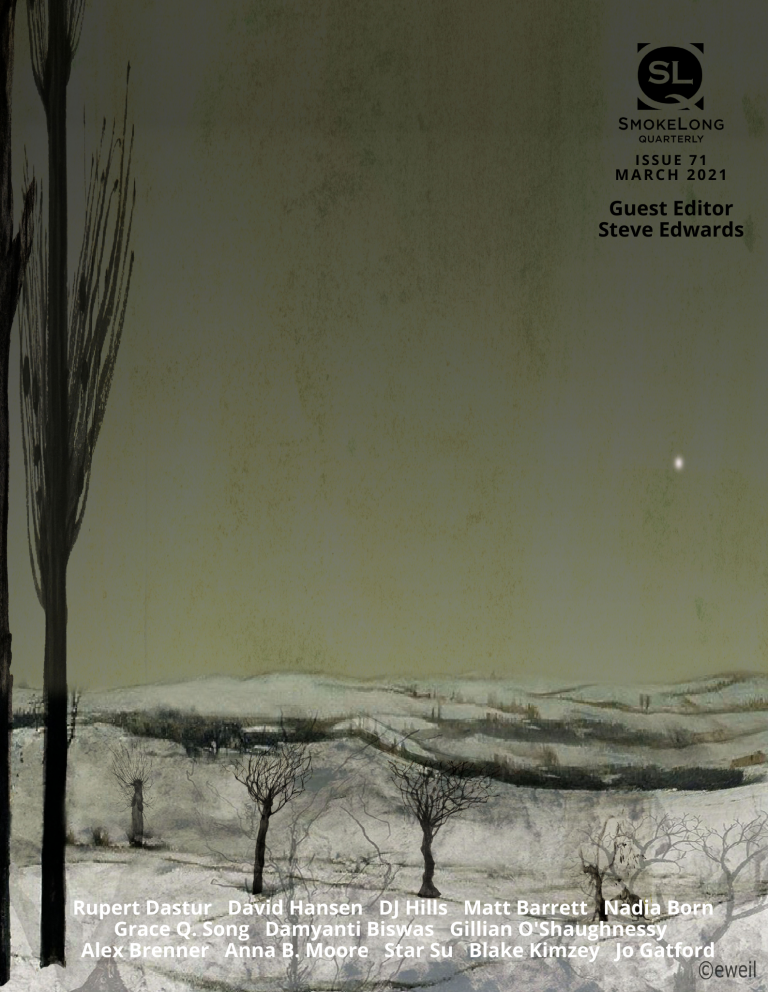Your story has a dreamlike quality, which is alluded to at the start when the narrator says about himself and the blood clot: “One of us is dreaming.” Throughout, there are confusions and hasty explanations (the speaking blood clot, the appearances of people who shouldn’t be there, the narrator’s shift on the scaffold from executioner to condemned). How important are dreams to your writing, and to you?
Dreams themselves aren’t very important to me, but dreamlikeness is. Real life is disappointing. I resent its refusal to mean anything, and I want to make a certain kind of sense, with or without its help.
But what kind of sense? I’m not sure. I feel it when I make eye contact with my cat, which is the best explanation I can offer, short of writing a story.
Also, I don’t really know what the alternative to dreamlikeness is. Realism, I guess? But I don’t really recognize reality in realism. Realism doesn’t usually look very real. Realism usually looks like a crude parody of reality, a cruder parody than parody, even. The alternatives to realism—whatever they are—feel a lot more real, or at least more hospitable.
Blood clots are often life-threatening, and as a reader I surmise that this one is connected to the mother’s amputated leg. At the same time, it is a bit thoughtful; it speaks softly and in a conciliatory manner. How did you decide on the clot as the guiding character in the story?
This story and this character come out of an ordeal in my recent life, sad to say. At first, it seemed impossible to write through it. But it also seemed impossible to not write through it. And if I was going to write through it, I couldn’t just hate this blood clot for all the damage it was doing. That seemed inhumane, or degrading, or just boring, and of no use to anyone, least of all myself. I wanted to make peace with this blood clot, if I could. I wanted to acknowledge—or at least imagine—that it wasn’t evil, just hapless and unlucky. It felt morally important to make myself feel that, by force if necessary. I don’t know if it worked. Because I do hate that blood clot. I hate it right now, at this very moment. But at least now I have a story to remind me that, a little while ago, I tried not to.
The narrator’s conception of the guillotine alludes to “olden times.” Other stories of yours reference Egyptian pharaohs and British historical figures. What historic time would you want to visit?
Hatshepsut’s Egypt, or Akhnaten’s.
It’s sometimes hard for me to fathom that ancient Egypt actually happened and isn’t just something we made up to make ourselves feel smart. But there it is. It’s right there, right now, in Egypt. I’d like to see it for myself. And I’d like to see whether they knew they were hot shit. I bet they did.
What attracts you to flash fiction? Do you write in other forms or genres as well?
Flash fiction just fits me nicely. Most of my ideas are small ideas. It took me a lot of baggy four-thousand-word stories to learn this about myself, but I’m getting there.
But I definitely don’t foreswear longer work. If I have a four-thousand-word word idea, I try to give it four thousand words, a one-thousand-word idea one thousand words, and so on. I’d like my ideas to dress well at any size.
The title is “A Feast in My Honor,” and though the story mostly takes place around a dining room table, no literal feast is described. What should be served at a feast in your honor?
Sea scallops and ice water, please!



 The core workshop of SmokeLong Fitness is all in writing, so you can take part from anywhere at anytime. We are excited about creating a supportive, consistent and structured environment for flash writers to work on their craft in a community. We are thrilled and proud to say that our workshop participants have won, placed, or been listed in every major flash competition. Community works.
The core workshop of SmokeLong Fitness is all in writing, so you can take part from anywhere at anytime. We are excited about creating a supportive, consistent and structured environment for flash writers to work on their craft in a community. We are thrilled and proud to say that our workshop participants have won, placed, or been listed in every major flash competition. Community works.